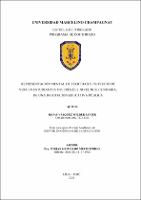Representación mental de felicidad y proyecto de vida en estudiantes mujeres del nivel III/secundaria, de una institución educativa pública
Resumen
La investigación sobre la representación mental de felicidad y proyecto de vida, hace una
aproximación a la comprensión de la realidad adolescente en contextos de carencia que
se manifiesta en aspectos tanto sociales como personales. Tuvo como objetivo el
comprender la representación mental de la felicidad y proyecto de vida. El tipo de
investigación fue cualitativa y el diseño fenomenológico. El muestreo utilizado
corresponde al no probabilístico de tipo homogéneo, para eso se aplicó la técnica de la
saturación de categorías y estuvo conformada por 17 participantes mujeres entre los 16 y
17 años, del último grado de secundaria. Los instrumentos utilizados fueron una entrevista
semiestructurada y grupo focal. Los resultados obtenidos mostraron que las adolescentes
realizan su representación mental de la felicidad y proyecto de vida a partir de los vínculos
desarrollados en sus núcleos familiares y la formación que de ellos reciben. Sus proyectos
dan valor al encuentro consigo mismas y a la presencia permanente de sus familias en su
proceso de realización. Se concluye que las adolescentes representan la felicidad en
proyectos donde se encuentre presente la familia y a la vez en la obtención de una carrera
profesional lo que implicaría esfuerzo constante desde el presente para alcanzar la meta
propuesta en el futuro. Las implicancias de los resultados han sido discutidas. Research on the mental representation of happiness and life project, makes an approach
to the understanding of adolescent reality in contexts of deprivation that manifests itself
in both social and personal aspects. Its objective was to understand the mental
representation of happiness and life project. The type of research was qualitative and the
design was phenomenological. The sampling used corresponds to the non-probabilistic
homogeneous type, for that the category saturation technique was applied and it was made
up of 17 female participants between 16 and 17 years old, from the last grade of secondary
school. The instruments used were a semi-structured interview and a focus group. The
results obtained showed that adolescents carry out their mental representation of
happiness and life project from the bonds developed in their family nuclei and the training
they receive from them. Their projects give value to the encounter with themselves and
to the permanent presence of their families in their process of realization. It is concluded
that adolescents represent happiness in projects where the family is present and at the
same time in obtaining a professional career, which would imply constant effort from the
present to achieve the goal proposed in the future. The implications of the results have
been discussed.


